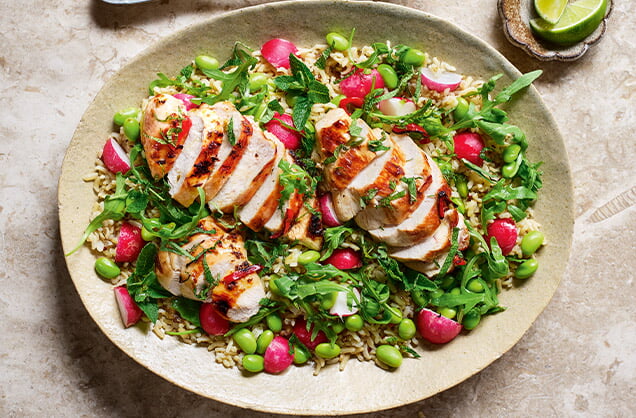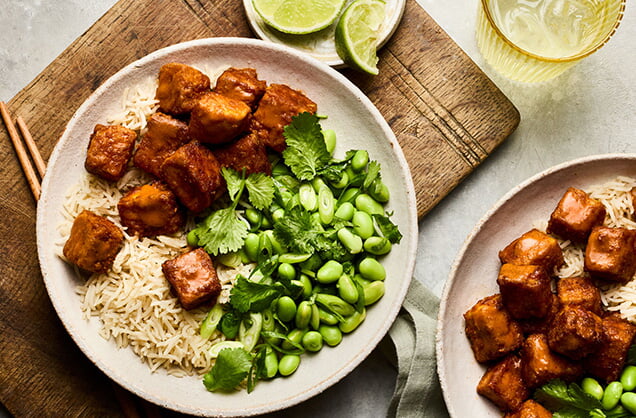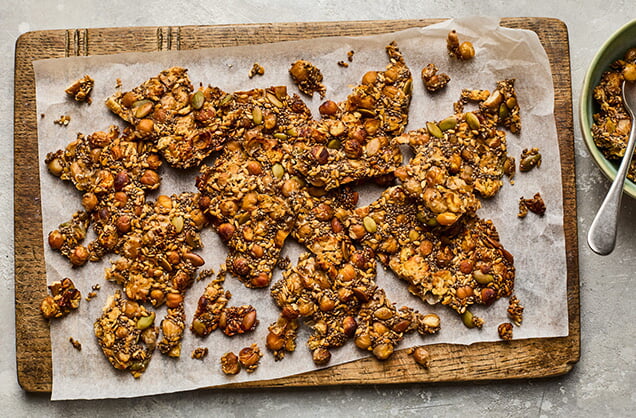What is protein?
Protein is a macronutrient made up of chains of amino acids that provide our bodies with energy (you may have heard of the term ‘macro’ before). When we consume protein, it’s broken down into amino acids which your body uses to build the proteins it needs for everyday functions.
What does protein help your body to do?
Your body contains a variety of proteins that all have different roles in keeping you healthy, such as:
- Building and maintaining muscle and bone health.
- Helping with cell growth.
- Maintaining healthy hormonal functions that regulate our mood, appetite and sleep.
- Supporting immune function.
- Balancing blood sugar levels.
What are complete and incomplete proteins?
There are two types of protein: complete and incomplete. Complete proteins contain all 9 amino acids your body needs to build and repair bone and muscle. Complete proteins typically come from animal-based sources, like meat and dairy products. Incomplete proteins don’t contain all the essential amino acids and are usually found in plant-based foods that are higher in fibre. Eating a varied diet with a mixture of different plant-based proteins can still give you all the protein and amino acids your body needs.

How much protein do I need in a day?
How much protein you need per day depends on many factors, including weight, gender and how physically active you are. Typically, dietary recommendations for protein are based on per kg body weight.
How much protein should an adult eat in a day?
For adults, this means 0.75g protein per kg. Women need roughly 45g per day, while men need 55g. If you’re very active and do a lot of sport or exercise, you’ll need more protein to help your muscles recover after exercise. Age, pregnancy and general health can also affect how much protein you need.
Did you know...? Most people in the UK are generally eating enough protein so don’t require supplements, like protein shakes. Focussing on eating protein sources that are also high in fibre and low in fat is the best way to ensure a well-balanced diet. It’s important to get your daily protein intake from a range of different food groups for a balanced diet.
How can I incorporate protein into my diet?
See our top tips on how to incorporate protein into your diet below.
Incorporating protein into breakfast
A portion of natural yogurt has 5-7g protein*. Try dolloping it onto your morning cereal or try adding chia seeds to your porridge (you could also make chia pudding if you want to try something a little different!).
Incorporating protein into lunch
On average, a serving of chicken breast typically has 25-30g protein*. Chicken salads are a great lunch option and this simple stir-fry is ready in just 15 minutes for a quick protein win. Half a can of beans contains roughly 10g protein* and tastes great in this speedy bean chilli pitta.
Incorporating protein into dinner
Try cooking with tofu (which has 6.5g protein per portion*) for a plant-based alternative to meat, or add fish to pasta dishes and curries - white fish has 35-48g protein per fillet*!
Incorporating protein into snacks
Seeds and nuts are great snack options for when you’re feeling peckish and perfect for homemade trail mix or roasting with spices. A handful of mixed nuts and seeds will give you 7g protein*.

What are some high-protein plant-based foods
You don’t need to follow a meat-based diet to achieve your daily protein intake. Many plant-based foods are good sources of protein:
Did you know...? Tofu is considered a ‘complete protein’, even though it’s not made from an animal product. Check out our buffalo tofu recipe.

What are some examples of high-protein foods?
Healthily hitting your protein intake doesn’t have to be a challenge. Many of your favourite foods are good sources of protein and a few simple swaps is the best way to maintain healthy eating habits:
- Choose lean cuts of meat and mince, and eat less red and processed meat like bacon, ham and sausages.
- Aim to eat 2 portions of fish a week (with each portion being roughly 140g). One of these should be an oily fish, like salmon, sardines and mackerel – this includes frozen and tinned fish, which are easy and affordable proteins.
- Eggs are a great source of protein and very versatile.
- Dairy products, like milk, yogurt and cheese, are foods you likely eat every day and are naturally high in protein (plus rich in calcium).

What are some easy protein swaps and ideas for hit my protein intake?
If you want to healthily hit your protein intake, try these easy protein tips and swaps:

How can I maintain my family’s protein intake?
Healthily maintaining your family’s protein intake doesn’t require lots of changes. Little swaps and additions to your family’s favourite meals can help give you a protein-rich diet.

Protein is important for a balanced diet, whatever your activity level. By making a few smart swaps, you can easily hit your protein goals without making any drastic changes to your diet. Embracing protein that’s found naturally in foods, like lean meats, dairy products and pulses, is an easy way to ensure you and your family are getting the advised protein intake amounts.
*https://www.uhsussex.nhs.uk/resources/protein-fact-sheet/